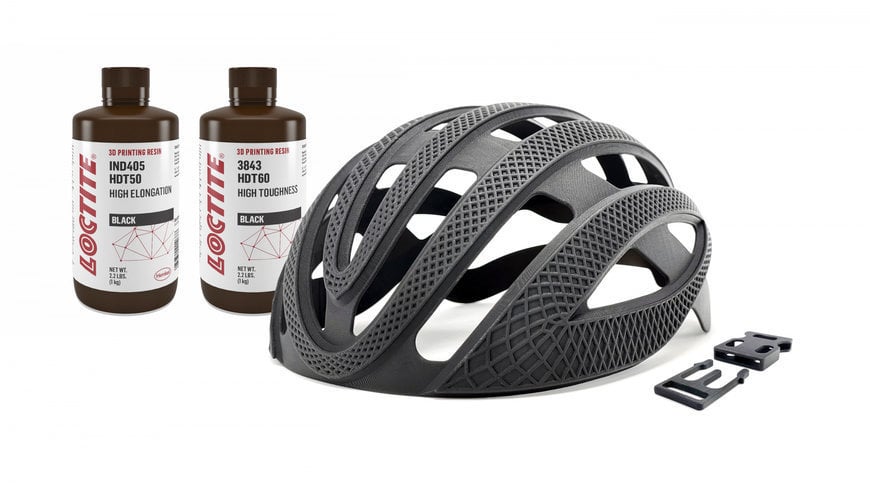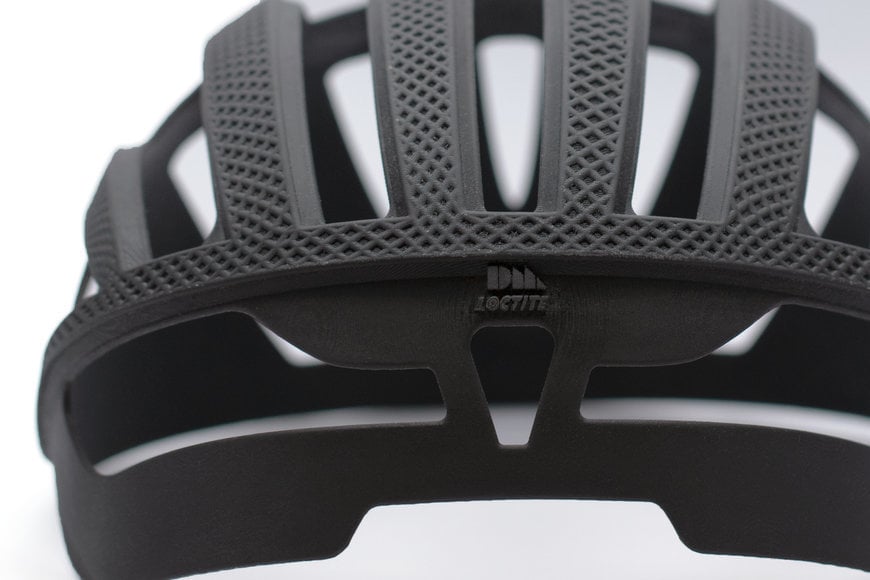Desktop Metal Expands Partnership with Henkel, Qualifies Two Popular Loctite® Materials on Xtreme 8K, the World’s Largest DLP 3D Printer
Desktop Metal, Inc, a global leader in additive manufacturing technologies for mass production, today announced that it is expanding its partnership with Henkel on photopolymer material development, beginning with the qualification of Henkel’s Loctite® 3D IND405 Black and Loctite 3D 3843 for use on the Xtreme 8K, the world’s largest DLP printer for high-volume production of end-use parts.

This bicycle helmet was 3D printed on the ETEC Xtreme 8K in Loctite 3D IND405™ Black while the clip was printed in Loctite 3D 3843. These two popular photopolymers, developed and produced by Henkel, are now qualified on the ETEC Xtreme 8K, the world’s largest DLP printer.
- Loctite 3D IND405™ Black and Loctite 3D 3843, two popular photopolymers developed and produced by Henkel, are now qualified on the ETEC Xtreme 8K
- Loctite 3D IND405™ Black is a rigid, high-strength, high elongation material with outstanding impact resistance and surface finish – properties that make it ideal for a wide range of end-use parts and products
- Loctite 3D 3843 is a rigid, high-strength engineering plastic with excellent surface finish, making it a good general-purpose material for end-use products
- The ETEC Xtreme 8K offers the world’s largest DLP build area for 3D printing extremely large parts, such as automotive armrests and bicycle helmets, or a high volume of smaller parts, such as snap-fit joints, fasteners, brackets, housing and more
- 3D printing IND405 Black on the Xtreme 8K saves time and money for manufacturers by eliminating the need to use expensive tooling that can take weeks to produce for the final production of injection molded plastic parts
- Desktop Metal’s ETEC brand and Henkel have partnered to drive adoption of production 3D printing since 2020 and are now expanding the collaboration to development and qualification of materials for new DLP approaches, including top-down DLP featured on the Xtreme 8K
Both popular engineering materials in the 3D printing industry at large, Loctite 3D IND405 Black and Loctite 3D 3843 are both stiff, strong and durable – making them ideal for a wide range of end-use manufacturing parts and consumer goods. Parts produced in IND405 have outstanding impact resistance and can be machined, tapped and polished.
Loctite 3D IND405 and 3843 are already offered in the ETEC Envision One desktop DLP printer, along with high-temperature photopolymers (Loctite 3955 HDT 280 FST, IND 147, and IND 406), elastomers (Loctite 475 and IND 402), and Loctite Med 413, a biocompatible plastic ideal for medical devices and equipment.
Now, customers will be able to print Loctite 3D IND405 and 3843 on the Xtreme 8K, which features a market-leading build area of 450 x 371 x 399 mm (17.72 x 14.61 x 15.71 in). This new combination of a trusted and popular material on an extremely large printing platform will enable users to deliver all-new sizes and throughput of parts without tooling.

“Our team is delighted to partner with Henkel and offer their Loctite materials on our truly differentiated DLP printing systems,” “By printing Loctite 3D IND405 HDT50 High Elongation and Loctite 3D 3843 HDT60 High Toughness on the ETEC Xtreme 8K, manufacturers will be able to produce on-demand end-use parts in all-new sizes and at higher throughputs that help drive down the per-part cost. What’s more, they won’t need to pay for, or wait for, tooling to get the job done affordably,” said Ric Fulop, Founder and CEO, Desktop Metal.
“A while back, I saw the Xtreme 8K before its release and knew it would excite the industrial additive space with the large build volume. I am pleased with our teams' work to bring Loctite resins to the platform with initial workflow validations," added Sam Bail, Head of Business Development Management and Partnerships for Loctite 3D Printing at Henkel.
Benefits of Top-Down DLP Printing
Digital Light Processing, or DLP, harnesses the power of light from a video projector to cure liquid resins into part designs layer by layer, one quick flash at a time. It is one of the most mature methods of 3D printing, and it’s been used for high volume manufacturing for years.
While most DLP printers feature a video projector below a build tray, where parts must be suspended hanging down from a build plate as they are printed, manufacturers interested in high-volume throughput have begun to appreciate the challenges with this approach to DLP. Extremely large parts, especially those with heavier or elastomeric properties, are difficult to suspend from a build plate. This build strategy also requires more support structures that must be removed, a challenge when processing a higher volume of parts.
The ETEC Xtreme 8K, which is already used today to manufacture end-use parts for consumer goods, is one of the 3D printing industry’s few commercially available top-down DLP printers, with two overhead industrial video projectors. The different approach allows extremely heavy parts to be 3D printed on a tray in a vat with thicker viscosity materials. This simplifies throughput workflows, as parts do not require mechanical removal from the build plate.
What’s more, this approach allows the light or energy from the projector to directly penetrate the photopolymer, eliminating the barrier of a tray that exists in bottom-up DLP printing. This allows processing of different types of materials, which can deliver new properties.
In addition to Loctite IND405 and 3843, the Xtreme 8K prints an all-new category of durable, highly resilient DuraChain™ photopolymers that deliver two-part material strength in a single pot, such as FreeFoam™, Elastic ToughRubber™ and Soft ToughRubber™. DuraChain materials are available exclusively on ETEC printers.
To learn more about the ETEC Xtreme 8K, Loctite 3D IND405, and Loctite IND 3843 and other available materials, visit etec.desktopmetal.com.
www.desktopmetal.com

